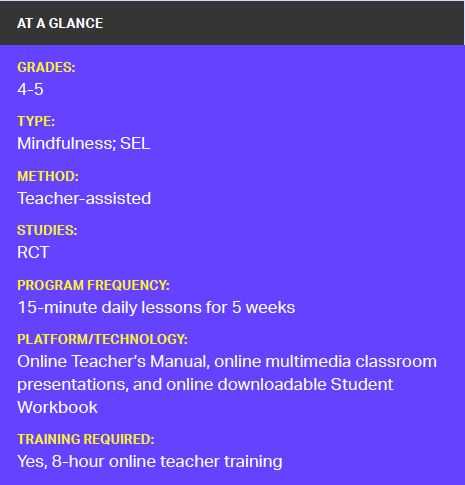 Master Mind is a mindfulness education prevention program designed to enhance the coping strategies and decision-making skills of elementary school students to prevent substance abuse. It is a product of innovation Research & Training (iRT), founded in 1999 by Dr. Janis Kupersmidt, who is a clinical child psychologist. Dr. Kupersmidt, President and Senior Research Scientist at iRT, sought to bridge research, intervention, and prevention to address real-world challenges, and developed Master Mind with Dr. Alison Parker (PI) with the support of grants from the National Institute of Drug Abuse (NIDA) and the National Institute of Alcohol Abuse and Alcoholism (NIAAA).
Master Mind is a mindfulness education prevention program designed to enhance the coping strategies and decision-making skills of elementary school students to prevent substance abuse. It is a product of innovation Research & Training (iRT), founded in 1999 by Dr. Janis Kupersmidt, who is a clinical child psychologist. Dr. Kupersmidt, President and Senior Research Scientist at iRT, sought to bridge research, intervention, and prevention to address real-world challenges, and developed Master Mind with Dr. Alison Parker (PI) with the support of grants from the National Institute of Drug Abuse (NIDA) and the National Institute of Alcohol Abuse and Alcoholism (NIAAA).
The program is practiced 15 minutes daily for 5 weeks. It is implemented by a trained instructor who can be the classroom teacher, guidance counselor, social worker, prevention specialist, or a similar trusted educational professional. At the end of the program, students discuss plans to continue their mindfulness practice on their own and as a class, as the program is intended to develop a sustainable mindfulness practice among individual students and the school community. Research has shown that students using the program showed improved EF scores and fewer teacher-reported social problems and less aggressive behavior as compared to the control group.
Master Mind aligns with the Common Core and Healthy Living Essential Standards.
Program lessons are led by the trained instructor and Master Mind provides educators with a curriculum and teaching resources to support classroom or school adoption. Teachers are given access to the Master Mind Program website which includes the instructor’s kit: downloadable PDFs of the Teacher’s Manual and Student Workbooks, multimedia classroom presentations, and additional instruction resources. Teachers complete a web-based, on-demand, 8-hour training course followed by an online certification test, and have the option of participating in a free webinar with the program developer for additional training and to ask any follow-up questions.
While the program was designed to be taught in a classroom setting and the findings from the evaluation study noted below are based on this delivery method, the content and materials are flexible and can be taught in other settings and across multiple school subject areas.
An evaluation study investigating the efficacy of the Master Mind program for improving health outcomes of late elementary school-aged students has just been completed.
OVERVIEW: http://mastermindprogramsonline.com/
WEBINAR/VIDEO/DEMO: N/A
CONTACT: aparker@irtinc.us
KEY STUDIES SUMMARY:
A total of 111 students (71 – intervention, 40 – control) participated in the study. Students in the intervention group exhibited higher EF scores over control, as well as fewer teacher-rated social problems and less aggressive behavior. (Parker, A., Kupersmidt, J., Mathis, E., Scull, T., & Sims, C. (2014). The impact of mindfulness education on elementary school students: evaluation of the Master Mind program. Advances in School Mental Health Promotion, 7(3), 184-204. doi: 10.1080/1754730x.2014.916497) https://www.ncbi.nlm.nih.gov/pmc/articles/PMC4821437/
OTHER RESEARCH AVAILABLE:
Parker, A. & Kupersmidt, J. (2016). Two universal mindfulness education programs for elementary and middle school students: Master Mind and Moment. In K. Schonert-Reichl & R. Roeser (Eds). The Handbook of Mindfulness in Education: Emerging Theory, Research, and Programs (1), 335-354. New York: Springer Press. Available at https://link.springer.com/chapter/10.1007/978-1-4939-3506-2_21
Semple, R., Droutman, V., & Reid, B. (2016). Mindfulness goes to school: Things learned (so far) from research and real-world experiences. Psychology in the Schools, 54(1), 29-52. doi: 10.1002/ pits.21981 https://www.ncbi.nlm.nih.gov/pmc/articles/PMC5405439/